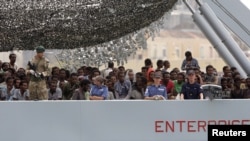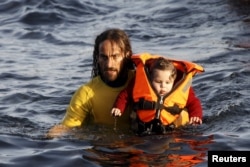The International Organization for Migration (IOM) reports that migrant deaths on the Mediterranean Sea routes to Europe are breaking all previous records.
IOM confirmed 3,350 fatalities so far this year, surpassing the record-breaking death toll of 3,279 for all of 2014.
Deaths off the Greek islands, notably Lesbos and Samos, have surged with the cold weather setting in. IOM estimates that 435 men, women, and children died on the Eastern Mediterranean route linking Turkey to Greece in the last three-and-one-half weeks.
IOM spokesman Joel Millman said there appears to be no end in sight for this rising toll of migrants and refugees desperate to reach European shores.
“We know of at least 22 off Greece, in addition to almost that many not confirmed in the last 24 hours in Greece," he said. "Also, possibly as many as 40 killed in Spain this morning [Friday] ... There is no sign of this carnage tapering off and we are deeply concerned about what is ahead as the weather gets colder.”
Deadliest day
The past few days have been replete with shipwrecks and deaths. IOM describes Wednesday, October 28 as the deadliest day in the Mediterranean waters this year, with five fatal shipwrecks. Two occurred off the Greek island of Lesbos, another two off the coast of Samos, and one off the coast of Agathonist.
The agency said the worst incident was off the coast of Lesbos, when a wooden boat carrying from 300 to 500 migrants sank.
The U.N. refugee agency warned that the seaborne death toll will continue to rise as long as thousands of refugees are forced to make these perilous journeys to escape war and persecution.
Safe alternative
UNHCR spokesman Adrian Edwards said there needs to be a safe alternative to people risking their lives in these dangerous sea crossings.
“There also has to be a much more determined and concrete search for legal avenues for people to make this journey to Europe," he said. At the moment, we are seeing hundreds and hundreds of people making this journey by sea, overland. Lives are being lost.”
Edwards said those lucky enough to make it ashore alive are confronted with what he calls appallingly long lines of people waiting to be registered so they can move on to other countries in Europe.
He said reception facilities capable of quickly and efficiently screening and processing new arrivals must be established. But It's an open question who would take on that considerable task.






